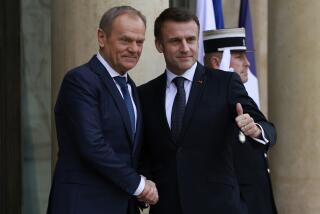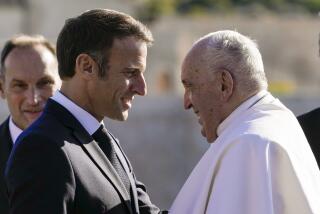In crisis, who speaks for Europe?
French President Nicolas Sarkozy belongs to a breed of politicians who seem to function in perpetual crisis mode.
At times his style -- reminiscent of, say, former New York Mayor Rudolph Giuliani -- comes off as abrasive. But during bona fide crises like the global economic meltdown, Sarkozy hits his stride and charges into the fray.
Even some detractors say that when the crisis struck, Sarkozy turned out to be the ideal figure to have at the helm of the European Union, a sluggish, fractious, 27-member bloc whose meetings on tough issues generally end with decisions to hold a future meeting.
Instead, Sarkozy charmed and cajoled fellow European leaders into a historic agreement for a coordinated, multibillion-dollar bank rescue plan that calmed hysterical markets last week.
Then Sarkozy, who holds the rotating EU presidency, zoomed to the United States, where he, European Commission President Jose Manuel Barroso and President Bush announced plans for a summit at which world leaders would work on the financial crisis. The French president hit the European Parliament in Strasbourg on Tuesday and trumpeted a typically ambitious plan for “a refoundation of world capitalism.”
Like Prime Minister Gordon Brown of Britain, Sarkozy has won new popularity at home and praise abroad. After 16 uneven months in office, he seized the chance to reassert French power on the world stage at a moment when several Western leaders are politically weak.
“I think he achieved his true stature as a man of state,” said Nicolas Baverez, an economist and historian who is among a group of informal advisors consulted by the president. “He is a man with a real capacity to manage events.”
Despite talk of competition between Brown and Sarkozy for the mantle of European leadership, their relationship has been necessarily cooperative and complementary, Baverez said. Because Britain retains the pound sterling currency rather than the euro, it wields influence but cannot speak for the EU the way France has.
“These are two men who know each other for some time and understand each other well,” Baverez said. “I really don’t think there is a competition, because Brown is too weakened at the level of domestic politics. Also, because the United Kingdom does not belong to the Eurozone, that is an arena where Sarkozy had to lead.”
Brown, the quiet technocrat, displayed his economic prowess in developing a British bank bailout that served as the model for the European plan. Sarkozy supplied political muscle and public relations flash to forge a continentwide consensus after uneasy days in which nations such as Germany and Ireland favored unilateral policies that worsened the chaos.
“I think that today everyone recognizes, even those who had doubts at first, that President Sarkozy not only has a great political energy, but also exceptional qualities as a leader,” Barroso said in an interview with Le Figaro newspaper Tuesday.
Sarkozy seems the right man at the right place in terms of ideology as well as temperament. His center-right predecessor, Jacques Chirac, was a ponderous, cautious figure who feuded with American and European counterparts.
Sarkozy came to office last year as a hard-nosed center-rightist who nonetheless opened his government to centrist and leftist Cabinet ministers. On the foreign affairs front, he espoused a vision that balanced France’s traditional independence with an unusually pro-American attitude and a willingness to take risks.
And he has not hesitated, in classic French fashion, to respond with the power of a robust state to the breakdown of a marketplace overwhelmed by greed and disorder.
As the crisis began to escalate about six weeks ago, Sarkozy scolded a roomful of bankers and corporate executives for their role in runaway speculation and toxic investments, according to an account in L’Express magazine.
“It’s been years that you have played, that you have bought whatever you wanted in the United States, that you got all excited in the marketplace,” Sarkozy declared, according to the account. “And today when things go bad, you come running to the state!”
--
achrene.sicakyuz@latimes.com
Achrene Sicakyuz, reporting from Paris
Sebastian Rotella, reporting from Madrid
More to Read
Start your day right
Sign up for Essential California for news, features and recommendations from the L.A. Times and beyond in your inbox six days a week.
You may occasionally receive promotional content from the Los Angeles Times.






